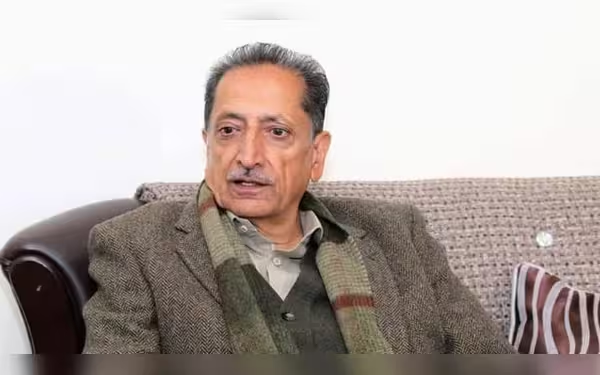Monday, December 23, 2024 09:40 AM
Justice Ejaz Afzal Defends Nawaz Sharif Disqualification Ruling
- Justice Ejaz defends JIT's formation and integrity.
- Nawaz Sharif's disqualification linked to undisclosed salary.
- Judicial independence emphasized amid political pressures.
 Image Credits: geo
Image Credits: geoJustice (retd) Ejaz Afzal defends his ruling on Nawaz Sharif's disqualification, emphasizing judicial integrity amid political challenges.
In a significant development regarding the Panama Papers case, Justice (retd) Ejaz Afzal Khan has come forward to defend his controversial judgment that led to the disqualification of former Prime Minister Nawaz Sharif. This case, which has been a focal point of political discourse in Pakistan, revolves around allegations of corruption and financial misconduct involving the Sharif family.
Justice Ejaz, who was part of the five-member bench that ordered a Joint Investigation Team (JIT) to probe the allegations, confirmed that the members of the JIT were selected by the Supreme Court judges. He emphasized that the decision to include military personnel in the inquiry was made to prevent any potential interference from the Pakistan Muslim League-Nawaz (PML-N) government. "A WhatsApp call was made to ensure that the inquiry remained unbiased," he stated, shedding light on the behind-the-scenes processes that led to the formation of the JIT.
For the first time since his retirement in May 2018, Justice Ejaz has publicly discussed the intricacies of the Panama Papers case, including the selection of JIT members and the merits of the case itself. He expressed his belief that Nawaz Sharif should have been disqualified for failing to disclose a salary owed to him by his son, as highlighted in the JIT's findings.
During an in-depth discussion, Justice Ejaz addressed media claims regarding the selection process of the JIT members. He clarified that the Supreme Court judges were concerned about the integrity of the nominees proposed by the then-government, stating, "We didn't ask for any specific names; we only wanted a list of officials with the highest integrity to ensure impartiality." This statement underscores the judges' commitment to maintaining the integrity of the judicial process.
Concerns about government influence were also raised, particularly regarding the close ties of certain officials, such as the SECP chairman, to Nawaz Sharif. Justice Ejaz noted that such relationships could compromise the investigation's impartiality. He further elaborated on the inclusion of military officials in the JIT, explaining, "We chose military officials because those from other agencies were approachable. We wanted a fair investigation." This decision reflects the judges' determination to uphold the rule of law amidst political pressures.
Justice Ejaz also recounted an encounter with a military general during his tenure as Chief Justice of the Peshawar High Court, illustrating the challenges judges face in maintaining judicial independence. He firmly stated, "As long as I am here, I will follow the law and go by the book. I will never convict anyone without evidence." This commitment to justice is a crucial aspect of the judiciary's role in Pakistan.
In discussing the Hudaibiya Paper Mills case, Justice Ejaz confirmed that the judges had inquired about the status of an appeal against a high court decision. He expressed disappointment that the then-NAB chairman, Qamar Zaman Chaudhry, did not pursue the appeal, highlighting the complexities and potential political influences that can affect judicial proceedings.
As the nation grapples with ongoing judicial crises, Justice Ejaz's insights into the Panama Papers case provide a glimpse into the challenges faced by the judiciary in Pakistan. His reflections serve as a reminder of the importance of maintaining judicial integrity and independence in the face of political pressures. The discussions surrounding this case continue to resonate within the political landscape, emphasizing the need for transparency and accountability in governance.













